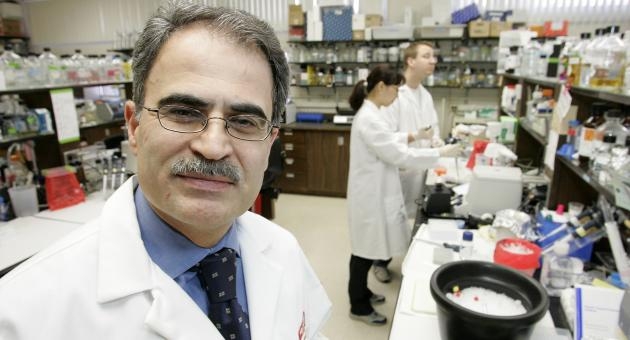Grant helps build NeuroAIDS research capacity

The National Institute of Mental Health (NIMH) has awarded Temple a five-year, $8.34 million grant to create a Comprehensive NeuroAIDS Core Center (CNAC) at the School of Medicine.
The new center, one of only nine funded by NIMH, will enable researchers to study basic science and clinical aspects of HIV-induced neurological diseases and neurocognitive disorders. Kamel Khalili, Laura H. Carnell Professor and chair of neuroscience, is the principal investigator on the project.
“Many of the neuroAIDS-related grants at Temple have been focused on the basic science aspects of the disease,” said Khalili, who is also director of the Center for NeuroVirology. "We have learned a great deal about the pathways that HIV deregulates in the brain and the mechanisms involved in causing AIDS-associated neurological disease.
“The next step will be to take this information a bit further and bring it from the laboratory into the clinic,” he said. “In order to accomplish this goal, we need core facilities that foster the translational approaches that will be critical for developing better diagnostics and therapeutics for neuroAIDS.”
Researchers from several Temple departments, including neuroscience, medicine and psychiatry, will participate in various aspects of the center, Khalili said. In addition, CNAC will globalize its efforts by incorporating researchers from the Department of Microbiology at Drexel University’s College of Medicine who have established a partnership with an AIDS research clinic in Bangalore, India.
One of CNAC’s key features will be the ability to support basic scientists and clinicians looking to initiate research programs in neuroAIDS through proof-of-concept grants, said Khalili.
“For example, we will have the ability to provide seed funds to basic researchers and clinicians for pilots studies related to neuroAIDS projects and offer the services and expertise of the core facilities,” he said. “The goal is to assist them in obtaining the preliminary data needed to successfully seek funding from the NIH and other outside sources for continuing their studies.”
Khalili said that CNAC is designed to encourage collaboration between basic scientists and clinicians in order to develop novel ideas and new directions for translational research.
CNAC is a perfect fit with the recent focus on neuroscience initiatives at the School of Medicine, including the construction of a research laboratory for the new Institute for Translational Neuroscience (ITN) in the Medical Education and Research Building (MERB), a project funded by a $11.8 million grant from NIH last year.
“Our first steps were to develop a graduate program in biomedical neuroscience and establish an NIH-funded training grant in NeuroAIDS,” he said, adding that these initiatives were spearheaded by Neuroscience Professor Jay Rappaport.
“We developed the space through the ITN grant to consolidate neuroscience researchers at the medical school, and now we have secured funding for CNAC that will support the critical mass of neuroscience research that will be taking place in MERB,” said Khalili. “Funding for core facilities provides a solid foundation for Temple to continue to build an international center for research on neuroAIDS and other neurological disorders.”